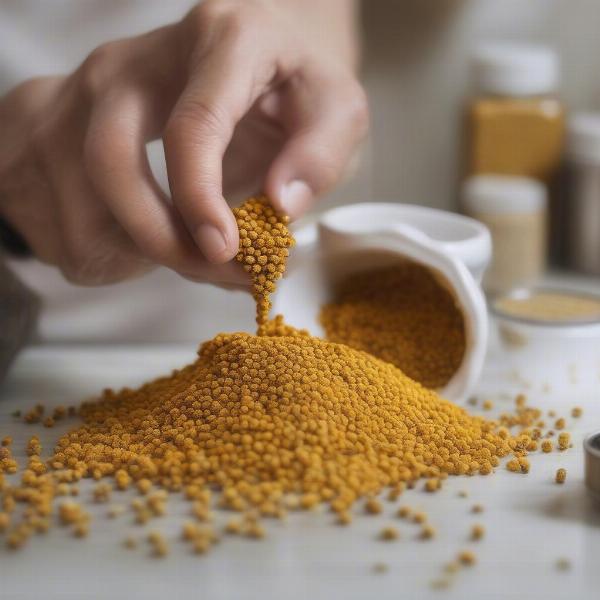Bee pollen has gained popularity as a nutritional supplement for humans, but what about our canine companions? Is bee pollen good for dogs, or is it something best left to the bees? This article will explore the potential benefits and risks of giving bee pollen to your dog, helping you make an informed decision about whether or not to include it in their diet.
Understanding Bee Pollen and its Composition
Bee pollen is essentially flower pollen collected by bees, mixed with nectar and bee secretions. It’s a rich source of vitamins, minerals, amino acids, antioxidants, and enzymes. While these nutrients are beneficial for humans, it’s important to understand how they might affect dogs.
Potential Benefits of Bee Pollen for Dogs
Some proponents suggest that bee pollen can offer several potential benefits for dogs, including:
- Allergy Relief: Bee pollen is sometimes touted as a natural remedy for seasonal allergies in dogs. The theory is that small amounts of pollen can desensitize the immune system over time. However, scientific evidence supporting this claim in dogs is limited.
- Improved Energy Levels: The various nutrients in bee pollen might contribute to increased energy levels in some dogs.
- Enhanced Immune System: The antioxidants and vitamins present in bee pollen could potentially boost the immune system.
- Wound Healing: Some believe bee pollen can aid in wound healing due to its anti-inflammatory and antimicrobial properties.
- Improved Coat and Skin Health: Bee pollen’s nutritional profile may contribute to a healthier coat and skin.
Risks and Considerations of Bee Pollen for Dogs
While bee pollen offers potential benefits, there are also potential risks to consider:
- Allergic Reactions: Just as bee pollen can trigger allergies in humans, it can also cause allergic reactions in dogs. These reactions can range from mild skin irritation to severe anaphylactic shock. Always start with a very small amount and monitor your dog closely for any adverse reactions.
- Contamination: Bee pollen can be contaminated with pesticides, herbicides, or other toxins if not sourced from reputable suppliers.
- Interactions with Medications: Bee pollen may interact with certain medications. If your dog is on any medication, consult your veterinarian before giving them bee pollen.
How to Give Bee Pollen to Your Dog
If you decide to give your dog bee pollen, do so cautiously. Start with a tiny amount, about the size of a grain of rice, and gradually increase the dosage over several weeks, if tolerated. Mix the pollen with their food. Always purchase bee pollen from a reputable source to ensure quality and purity.
 How to Give Bee Pollen to Your Dog
How to Give Bee Pollen to Your Dog
When to Avoid Bee Pollen
Avoid giving bee pollen to pregnant or lactating dogs, puppies, and dogs with known bee allergies or other sensitivities. If your dog has any underlying health conditions, consult your veterinarian before adding bee pollen to their diet.
Is Bee Pollen Right for Your Dog?
Ultimately, the decision of whether or not to give bee pollen to your dog is a personal one. While it offers potential benefits, it also carries potential risks. Careful consideration, close monitoring, and consultation with your veterinarian are essential.
Conclusion
Bee pollen might offer some health benefits for dogs, including potential allergy relief, increased energy, and immune system support. However, it’s crucial to be aware of the potential risks, such as allergic reactions and contamination. Always start with a small amount, monitor your dog closely, and consult your veterinarian before adding bee pollen to your dog’s diet. Is bee pollen good for dogs? The answer, like many things in pet care, depends on the individual dog and their specific needs.
FAQ
- What are the signs of an allergic reaction to bee pollen in dogs? Signs can include itching, hives, swelling, difficulty breathing, and vomiting.
- How much bee pollen should I give my dog? Start with a very small amount (grain of rice-sized) and gradually increase, if tolerated, under veterinary guidance.
- Where can I buy bee pollen for my dog? Purchase from reputable health food stores or suppliers specializing in pet supplements.
- Can I give bee pollen to my puppy? It’s best to avoid bee pollen for puppies.
- Is bee pollen a substitute for regular dog food? No, bee pollen is a supplement, not a complete and balanced food.
- What should I do if my dog has an allergic reaction to bee pollen? Contact your veterinarian immediately.
- Can bee pollen cure my dog’s allergies? There’s limited scientific evidence to support this claim. Consult your vet for appropriate allergy treatment.
ILM Dog is your trusted resource for all things dog-related. We provide expert advice on dog breeds, health, training, nutrition, grooming, and much more. Whether you’re a new dog owner or a seasoned pro, our articles are designed to help you provide the best possible care for your furry friend. From choosing the right itch spray for dogs to understanding why your dog gnaws on leg, we’ve got you covered. We also offer insights into specific health concerns, such as when your dogs face swollen or if you need allergy spray for dogs. Contact us for professional guidance on all aspects of dog care. Email: [email protected], Phone: +44 20-3965-8624. Visit ILM Dog today!